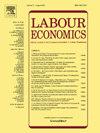这一次是不同的——生成人工智能和职业选择
IF 2.6
2区 经济学
Q2 ECONOMICS
引用次数: 0
摘要
我们展示了以ChatGPT形式推出的生成式人工智能(AI)对年轻人寻找学徒职位空缺行为的因果影响。为了估计短期和中期影响,我们使用了多种方法,包括利用2022年ChatGPT意外发射的外生性质的不连续差异方法。在短期和中期,寻找职位空缺的强度明显下降,这表明积极寻求学徒机会的年轻人的供应量显著减少,并表明受影响的群体存在很大的不确定性。认知任务占比高、对语言技能要求高的职业尤其受影响。有趣的是,年轻求职者在搜索行为中所显示的偏好与之前专家对职业自动化风险的评估形成对比,并与这些新评估存在之前对职业的人工智能和语言模型暴露的最新评估相一致。值得注意的是,虽然供应下降并没有减少签订学徒合同的数量,但我们发现申请人质量下降的证据,特别是对于瑞士最广泛提供学徒的商业雇员。本文章由计算机程序翻译,如有差异,请以英文原文为准。
This time it’s different – Generative artificial intelligence and occupational choice
We show the causal influence of the launch of generative artificial intelligence (AI) in the form of ChatGPT on the search behavior of young people for apprenticeship vacancies. To estimate the short- and medium-term effects, we use a variety of methods, including a difference-in-discontinuity approach exploiting the exogenous nature of the unanticipated launch of ChatGPT in 2022. There is a strong short- and medium-term decline in the intensity of searches for vacancies, indicating a notable reduction in the supply of young people actively seeking apprenticeships and suggesting great uncertainty among the affected cohort. Occupations with a high proportion of cognitive tasks and with high demands on language skills were particularly affected by the decline. Interestingly, the revealed preferences in the search behavior of young job seekers contrasted with previous expert assessments on the automation risks of occupations and aligned with the most recent assessments of the AI and language model exposure of occupations – before these new assessments existed. Notably, while the supply decline did not reduce the number of signed apprenticeship contracts, we find evidence of declining applicant quality, particularly for commercial employees, the most widely offered apprenticeship in Switzerland.
求助全文
通过发布文献求助,成功后即可免费获取论文全文。
去求助
来源期刊

Labour Economics
ECONOMICS-
CiteScore
3.60
自引率
8.30%
发文量
142
期刊介绍:
Labour Economics is devoted to publishing research in the field of labour economics both on the microeconomic and on the macroeconomic level, in a balanced mix of theory, empirical testing and policy applications. It gives due recognition to analysis and explanation of institutional arrangements of national labour markets and the impact of these institutions on labour market outcomes.
 求助内容:
求助内容: 应助结果提醒方式:
应助结果提醒方式:


